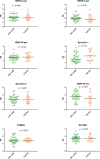Adults with celiac disease exhibit overexpression of endogenous retroviruses, TRIM28, and SETDB1 despite gluten-free diet
- PMID: 40769425
- PMCID: PMC12357293
- DOI: 10.1016/j.virusres.2025.199613
Adults with celiac disease exhibit overexpression of endogenous retroviruses, TRIM28, and SETDB1 despite gluten-free diet
Abstract
Celiac disease (CeD) is a disorder due to abnormal immune response to gluten protein in individuals with predisposing genotypes. Its origin is not fully understood. Human endogenous retroviruses (HERVs) derive from ancestral infections of germinal cells and represent 8 % of the human DNA. They are mostly inactive, but some can be activated. Their aberrant expressions are associated with inflammatory and immune-mediated diseases. HERV transcription is modulated by TRIM28 and SETDB1, which are also directly implicated in epigenetic processes and modulation of the immune response. We reported HERV overexpressions in CeD children at diagnosis. In the current prospective study, using a PCR real-time Taqman amplification assay, we explored the transcription levels of HERV-H-pol, -HERV-K-pol, and HERV-W-pol, of syncytin 1 (SYN1), SYN2, and HERV-W-env, as well as of TRIM28 and SETDB1 in the whole blood from 51 adults with CeD after years of good compliance with gluten-free diet (GFD) as compared to healthy controls (HC) of similar age. The transcriptional levels of every HERV and of TRIM28/SETDB1 were significantly higher in CeD patients than in HC (constantly with p < 0.0001). Positive correlations were found between the RNA levels of TRIM28 or SETDB1 and HERVs in CeD patients. The upregulation of HERVs, TRIM28, and SETDB1 and their positive correlations are suggestive clues of their contribution to the pathophysiology of CeD and might justify the persistent risk of developing, despite GFD, autoimmune diseases, neuropsychiatric disturbances, and cancers, all disorders characterized by enhanced HERV expressions and epigenetic alterations.
Keywords: Celiac disease; GFD; Human endogenous retroviruses; SETDB1; TRIM28; epigenetics.
Copyright © 2025. Published by Elsevier B.V.
Conflict of interest statement
Declaration of competing interest The authors declare no conflicts of interest.
Figures








Similar articles
-
Patients with Irritable Bowel Syndrome Exhibit Aberrant Expression of Endogenous Retroviruses and SETDB1.Cells. 2025 Jan 29;14(3):196. doi: 10.3390/cells14030196. Cells. 2025. PMID: 39936987 Free PMC article.
-
Children with Chronic Immune Thrombocytopenia Exhibit High Expression of Human Endogenous Retroviruses TRIM28 and SETDB1.Genes (Basel). 2023 Aug 1;14(8):1569. doi: 10.3390/genes14081569. Genes (Basel). 2023. PMID: 37628621 Free PMC article.
-
Enhanced Transcription of Human Endogenous Retroviruses and TRIM28 Downregulation in Patients with Inflammatory Bowel Disease.Viruses. 2024 Oct 5;16(10):1570. doi: 10.3390/v16101570. Viruses. 2024. PMID: 39459904 Free PMC article.
-
Celiac Disease and Gluten-Free Diets: A Path or Barrier to Food (In)Security?Nutrients. 2025 Jun 8;17(12):1956. doi: 10.3390/nu17121956. Nutrients. 2025. PMID: 40573067 Free PMC article.
-
Efficacy of a Low-FODMAP Diet for Coeliac Patients with Persistent IBS-like Symptoms despite a Gluten-Free Diet: A Systematic Review.Nutrients. 2024 Apr 8;16(7):1094. doi: 10.3390/nu16071094. Nutrients. 2024. PMID: 38613127 Free PMC article.
References
-
- Adoue V., Binet B., Malbec A., et al. The histone methyltransferase SETDB1 controls T helper cell lineage integrity by repressing endogenous retroviruses. Immunity. 2019;50:629–644. e8. - PubMed
-
- Balada E., Vilardell-Tarrés M., Ordi-Ros J. Implication of human endogenous retroviruses in the development of autoimmune diseases. Intern. Rev. Immunol. 2010;29:351–370. - PubMed
-
- Biagi F., Andrealli A., Bianchi P.I., et al. A gluten-free diet score to evaluate dietary compliance in patients with coeliac disease. Br. J. Nutr. 2009;102:882–887. - PubMed
MeSH terms
Substances
LinkOut - more resources
Full Text Sources
Medical
Miscellaneous

